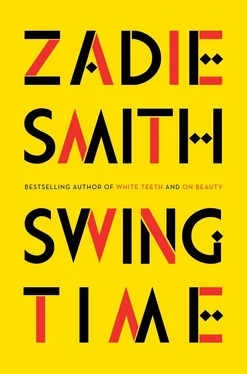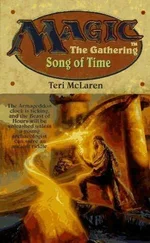“I wouldn’t… Honestly, Esther, I don’t think any of that stuff is real.”
“Oh, well,” said Esther equably, as if she’d said she liked chocolate and I’d said I didn’t. “Here for us it is real, because there is a lot of power there for sure. We hear a lot about this.”
“It is real,” confirmed Hawa, “but on this internet, believe me, you can’t trust everything! For example, my cousin showed me photos of this white man, in America, he was as big as four men, so fat! I said, ‘Are you so foolish, this is not a real photograph, come on! It’s not possible, no one could be like this.’ These kids are crazy. They believe everything they see.”
• • •
By the time we made our way back to the compound it was black outside, starlit. I linked arms with Lamin and Hawa and tried teasing them a little.
“No, no, no, even although I call her Little Wife,” protested Lamin, “and she calls me Mr. Husband, it is the truth that we are just age mates.”
“Flirt, flirt, flirt,” said Hawa, flirting, “and that’s it!”
“And that’s it?” I asked, kicking the door wide with my foot.
“That is certainly it,” said Lamin.
In the compound many of the younger children were still awake and ran to Hawa, delighted, as she was delighted to receive them. I shook hands with all four grandmothers, which always had to be done as if it were the first time, and each woman leaned in to try to tell me something important — or, more accurately, did tell me something important, which I happened not to understand — and then, when words failed, as they always did, pulled me slightly by my wrapper toward the far end of the porch.
“Oh!” said Hawa, walking over with a nephew in her arms, “but there is my brother!”
He was a half-brother in fact and did not look much like Hawa to me, was not beautiful like her and had none of her flair. He had a kind, serious face, which was round like hers but double-chinned with it, a smart pair of glasses and an utterly neutral way of dressing that told me, before he did, that he must have spent time in America. He was standing on the verandah, drinking a large mug of Lipton’s, his elbows resting on the lip of the concrete wall. I came round the pillar to shake hands with him. He took my hand warmly but with his head drawn back, and a half-smirk, as if bracketing the gesture in irony. It reminded me of someone — my mother.
“And you’re staying here in the compound, I see,” he said, and nodded at the quiet industry all round us, the shrieking nephew in Hawa’s arms, whom she now released to the yard. “But how does rural village life treat you? You have to first habituate yourself to the circumstances to appreciate it fully, I think.”
Instead of answering him I asked him where he had learned his perfect English. He smiled formally but his eyes hardened briefly behind his glasses.
“Here. This is an English-speaking country.”
Hawa, unsure what to do with this awkwardness, giggled into her hand.
“I’m enjoying it very much,” I said, blushing. “Hawa has been very kind.”
“You like the food?”
“It’s really delicious.”
“It’s simple.” He patted his well-rounded belly and handed his empty bowl to a passing girl. “But sometimes the simple is more flavorsome than the complicated.”
“Yes, exactly.”
“So: in conclusion, everything is good?”
“Everything is good.”
“It takes a while to acclimatize to this rural village life, as I say. Even for me, it takes a minute, and I was born here.”
Somebody now passed me a bowl of food, though I had already eaten, but as I felt that everything I did in front of Hawa’s brother was being presented as a kind of test I took it.
“But you can’t eat like that,” he fussed, and when I tried to rest the bowl on the wall, said: “Let’s sit.”
Lamin and Hawa stayed resting against the wall, while we lowered ourselves on to a pair of slightly wonky homemade stools. No longer under the eyes of every soul in the yard, Hawa’s brother relaxed. He told me he had gone to a good school in the city, near the university his father had taught in, and from that school had applied for a place at a private Quaker college in Kansas which gave ten scholarships a year to African students, and he had been one of them. Thousands apply, but he got in, they liked his essay, though it was so long ago now he barely remembered what it was about. He did graduate work in Boston, in economics, later he lived in Minneapolis, Rochester and Boulder, all places I had visited at one time or another with Aimee, and none of which had ever meant a thing to me, yet now I found I wanted to hear about them, perhaps because a day spent in the village felt, to me, like a year — time radically slowed there — so much so that now even Hawa’s brother’s tan slacks and red golf T-shirt could apparently inspire an exile’s nostalgic fondness in me. I asked him a lot of very specific questions about his time spent in my not-quite home, while Lamin and Hawa stood next to us, frozen out of the conversational picture.
“But why did you have to leave?” I asked him, more plaintively than I’d intended. He looked at me shrewdly.
“Nothing compelled me at all. I could have stayed. I came back to serve my country. I wanted to return. I work for the Treasury.”
“Oh, for the government.”
“Yes. But to him our Treasury is like a personal money-box… You are a bright young woman. I’m sure you probably heard about that.” He took a strip of gum from his pocket and was a long time removing the silver foil. “You understand, when I say ‘serve my country,’ I mean all of the people, not one man. You’ll understand, too, that at the moment our hands are tied. But they won’t always be. I love my country. And when things change, at least I will be here to see it.”
“Babu, right now you are here one day!” protested Hawa, throwing her arms around her brother’s neck. “And I want to talk to you about the drama in this yard— never mind the city!”
Brother and sister inclined their heads affectionately toward each other.
“Sister, I don’t doubt the situation here is more complicated — wait, I would like to finish this point for our concerned guest. You see, my last stop was New York. Am I correct in understanding that you’re from New York?”
I said yes: it was easier.
“Then you will know how it is, and how class works, in America. Frankly it was too much for me. I’d really had enough of it by the time I reached New York. Of course we have a system of class here, too — but not the contempt.”
“The contempt?”
“Now, let’s see… This compound you are in? This is our family you are among. Well, actually, a very, very small portion of it, but it will do in this example. Maybe to you they live very simply, they are rural village people. But we are foros , originally, nobles, through my grandmother’s line. Some people you will meet — the headmaster, for example, is a nyamalos , which means his people were artisans — they come in different varieties, blacksmiths, leather workers, etcetera… Or, Lamin, your family are jali , aren’t they?”
An extremely strained look passed over Lamin’s face. He nodded in a minimal way and then looked up and away, at the huge full moon threatening to slot itself into the mango tree.
“Musicians, storytellers, griots,” said Hawa’s brother, miming the strumming of an instrument. “While some people, on the other hand, are jongo . Many in our village are descended from jongos .”
“I don’t know what that is.”
“The descendants of slaves.” He smiled as he looked me up and down. “But my point is, the people here are still able to say: ‘Of course, a jongo is different from me but I do not have contempt for him.’ Under God’s eye we have our difference but also our basic equality. In New York I saw low-class people treated in a way I never imagined was possible. With total contempt. They are serving food and people are not making even eye contact with them. Believe it or not, I was sometimes treated that way myself.”
Читать дальше












